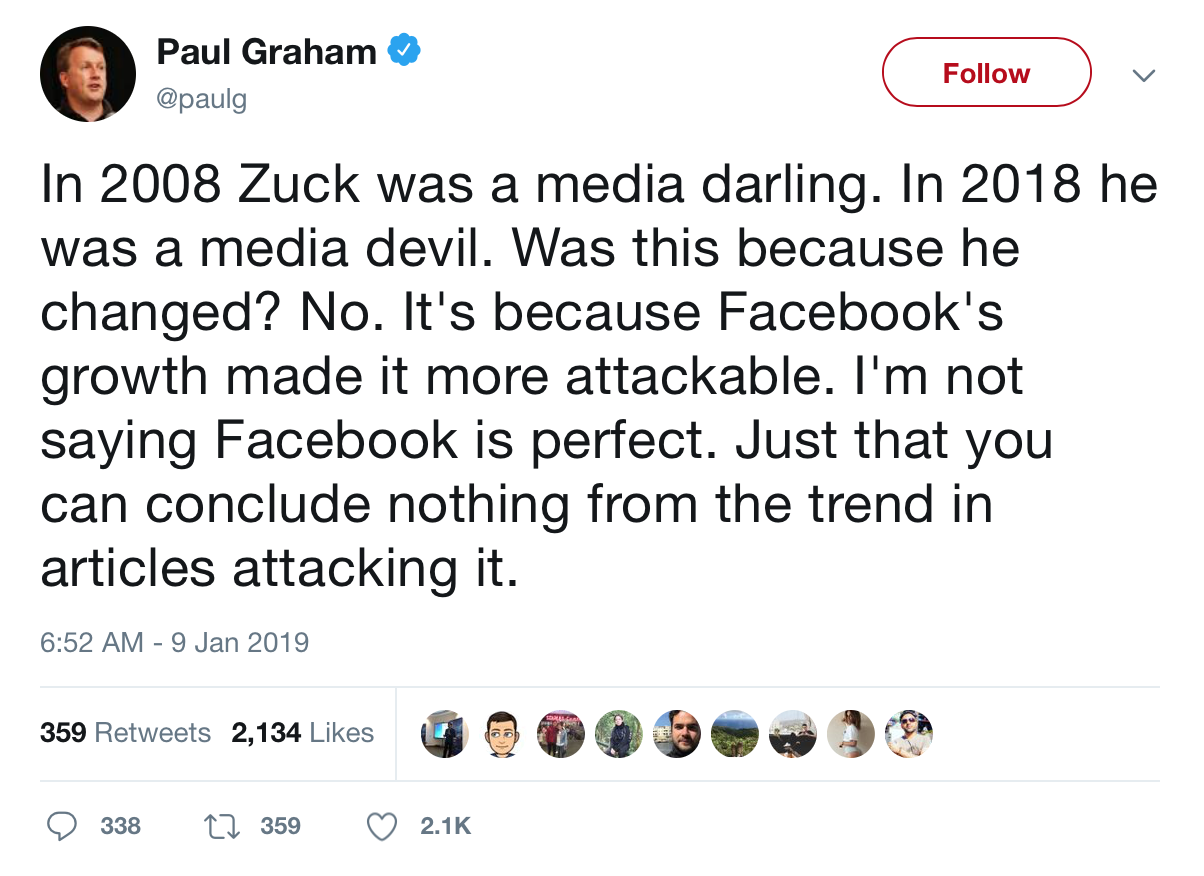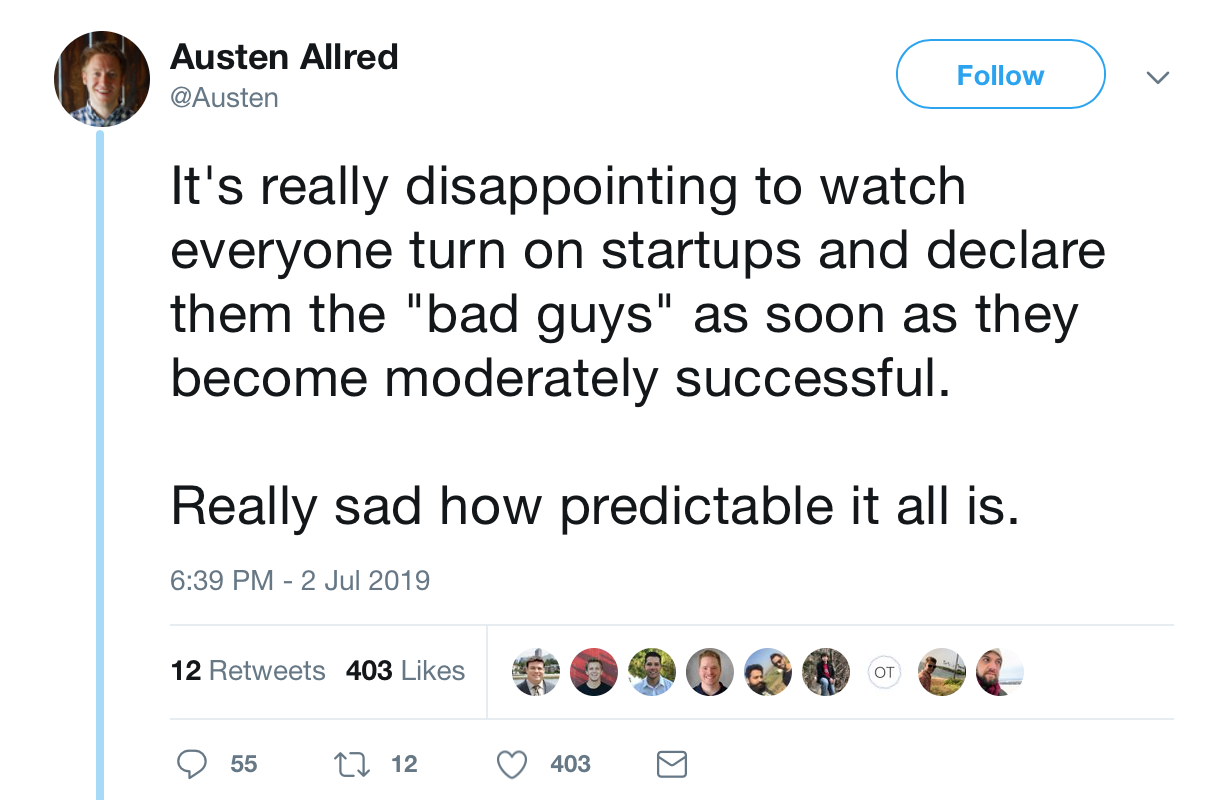There’s an unfortunate pattern amongst the Silicon Valley set whenever a startup heralding from their midst is subjected to even mild scrutiny. It’s perhaps best illustrated in its archetype by this tweet from Paul Graham:

In 2008, Facebook had a mere 100 million users. In 2018, they had over 2 BILLION users. The scope of a startup’s impact and influence is correlated to the amount of scrutiny it receives. This is a feature, not a bug!
And while Facebook is almost too easy of an example of this pattern, it’s far from the only one. Just yesterday, Mike Davidson wrote about the appalling and abusive read receipts feature in a new email client called Superhuman. The general response from Valley boosters was predictably disappointing (peruse @mikeindustries for countless examples), but I want to pull out one subtweet that struck me as another example in Graham’s spirit:

Do you see a thread here? It’s like the thinking goes that success does not attract scrutiny because of the broader impact it affords, but simply because conspiracy theorists are trying to hold down the makers! Yeah, the current Valley darling for email that’s received tens of millions in venture funding and is valued at a quarter of a billion already is the scruffy underdog. And just received a glowing puff piece in the NYT that didn’t address the privacy angle much. Ehhh…
I get it. Tribalism is in our DNA, and there’s nothing inherently wrong with rooting for the (spiritual or geographical) home team. But when that affection becomes a set of blinders or an apologist shield, you can’t be surprised when the broader community raises an eyebrow and is encouraged to dig deeper.
The reason this matters is that what may seem like small decisions early on become the basis for many more decisions down the road. These decisions affect your ethical trajectory as a company.
Mike Davidson
Davidson’s point about the ethical trajectory of a company is spot on. But it goes even further than the single company. There’s an ethical trajectory of a whole ecosystem, and the one in Silicon Valley is in need of some serious recalibration. Springing to the defense of appalling privacy abuses with excuses like “well, everyone else does it” only reveals just how dire the need is for that recalibration. A process that has to start with one company at a time.
But even if Silicon Valley was a beacon of ethical behavior, you’d still want successful startups on a strong trajectory to have their business model and practices subjected to scrutiny in proportion to their success. The more people are using something, the greater the potential for harm (and good). This isn’t rocket science.
Successful startups (and their boosters) should celebrate the scrutiny when it arrives by listening and making changes in actions and culture. The earlier you catch yourself drifting off course, the easier it is to get back on track. Not just of your goals for SUCCESS, but for being an ethical, responsive, and responsible company that even people outside the Valley can cheer for.


Another big example is Tesla. One of the most hated companies accross the globe.
While they have the safest cars…
The formula is actually quite simple: the more influence you have, the higher the probability you will annoy someone. It works for both companies and individuals.
Beautiful thoughts, David. I also notice that the authors of such criticism imply that some of these decisions were intentionally made. As if Superhuman *set out* to violate privacy expectations. I don’t believe this is the case, at all. Such a belief is an easy leap when you’re in conspiracy land, but a tough argument when dealing in reality. The truth is probably far more innocent. Perhaps hardly a decision at all, in the moment.
Superhuman was not the first to include such a tracking feature, and they’re not the only ones currently doing it – they just happen to be the lighting rod for the moment.
Not everything is a conspiracy, not everything was intentional, and not everyone is evil.
Yes, the more influence you have, the higher the probability you will annoy someone. True.
Yes, probably Superhuman didn’t *set out* to violate privacy expectations. True as well.
BUT…
As noted in the book “Mistakes were made (but not by me)” – which I recommend David, if you haven’t read it yet – and as noted by Mike Davidson in the blog post, people and companies start drifting away from ethics one small step at a time. Step by step. Bit by bit.
First they do this grey thing. Then another. Then another… and slowly but surely they’ll start doing really creepy things. Look at Zoom yesterday – they are running a web server on their clients’ Macs without their consent – jeopardizing their customers’ security for the sake of “user experience”. Again, a very thoughtful decision to improve user experience – I’m sure the motivation was great! – but the means don’t justify the end.
Thanks David for raising this issue. Both people and companies with more impact need more scrutiny. And need to evaluate each decision separately and not just as a consequence of past decisions… which drifts them from light grey to dark grey… to darkness…
Uh. Zuckerberg was a media darling in 2008, a pariah in 2018. True. He was also ruthless, underhanded, and consistently disregarding of his users the entire time.
So.